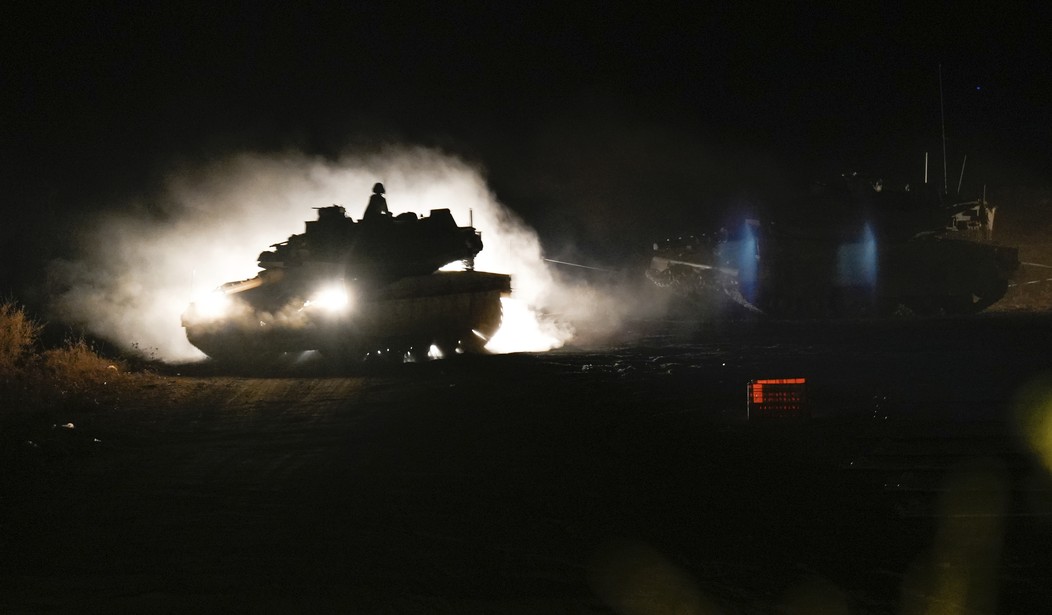Has anyone told Ali Khamenei in Tehran? Hold that thought; we'll get back to it.
One front in the wars imposed on Israel by Iran and its proxies may come to a close ... maybe. Lebanese prime minister Najib Mikati -- who operated as no more than a figurehead until Israel wiped out Hezbollah's command structure -- told Lebanese TV outlet Al Jadeed that a cease-fire could be just hours away. A proposal from US negotiator Amos Hochstein proposes that the US and other partners enforce UN Security Council Resolution 1701, which would force Hezbollah to withdraw north of the Litani River and disarm in favor of the Lebanese army.
This sounds more aspirational than practical, but it may indicate that some progress is being made:
Lebanon's caretaker Prime Minister Najib Mikati told Al Jadeed that he hopes for a ceasefire with Israel in the "coming hours," the Lebanese media site reported Wednesday evening.
Mikati said that while US special envoy Amos Hochstein was visiting Beirut, he brought a proposal that remained "confidential," the prime minister told Al-Jadeed.
He further emphasized that since September 21, there has been no communication with Hezbollah and that his main communication has been with Lebanese Parliament Speaker Nabih Mustafa Berri, leader of Amal, Hezbollah's primary rival in the Lebanese Shia community.
The plan itself sounds very familiar, as it should; it's essentially the agreement made by all parties in 2006, including Hezbollah. It calls for the Hezbollah to withdraw from the sub-Litani and for the Lebanese Army to control the region instead. All arms transactions would have to be handled by the official Lebanese government, which would prevent arms transfers to terror networks like Hezbollah. Once the US and other international bodies took responsibility for ensuring those conditions, Israel would withdraw back to its own borders.
And that all sounds good, except that Hezbollah was supposed to do that eighteen years ago. The United Nations and its UNIFIL "peacekeepers" were supposed to ensure compliance with UNSCR 1701. For the past eighteen years, however, the useless UNIFIL forces have instead provided cover for a massive arms build-up in the sub-Litani region by Hezbollah. In some cases, Hezbollah build their munition stores and command centers adjacent to UNIFIL outposts.
So what makes this different from 2006 and all the time in between? This time the US will get directly involved in enforcing the terms, along with some of our allies, rather than UNIFIL alone:
IDF forces will exit Lebanon within seven days of the end of hostilities and will be replaced by the Lebanese Armed Forces (LAF), with UN peacekeepers facilitating the transition. Ultimately, there will be 10,000 LAF troops along the border with Israel.
At the end of the 60 days, Israel and Lebanon will hold indirect negotiations through the US on fully implementing UN Security Council Resolution 1701 and resolving border disputes.
A new International Monitoring and Enforcement Mechanism (IMEM) will be created, chaired by the US, and include Italy, France, Germany, Spain, the United Kingdom, UNIFIL and regional countries.
So maybe we won't send troops back to Lebanon, which we abandoned in 1983 after Hezbollah killed hundreds of Marines (and dozens of French forces) in an earlier "peacekeeping" mission. However, it certainly looks as though that could be a possibility if the UNIFIL forces turn out to be as pusillanimous as they have been for the past 18 years. Had they done their job and enforced UNSCR 1701, this war may never have happened at all.
Besides, this all assumes that Hezbollah will go along with a plan that essentially reduces it to an unarmed political party. Has their leadership -- what remains of it, anyway -- given any indication that they will just disarm and hike north? Their third leader in the last few weeks declared his intention to assassinate Benjamin Netanyahu and bragged that his forces could fight for "months" ... but that he'd take an interest in a cease-fire, too:
Hezbollah’s new leader Naim Qassem threatened Prime Minister Benjamin Netanyahu’s life on Wednesday, but also appeared to open the door to a ceasefire with Israel, in his first speech since his appointment was announced on Monday. ...
The pre-recorded speech, delivered from an undisclosed location, was Qassem’s first address as the terror group’s leader. His appointment was announced on Monday, after Israel killed longtime terror chief Hassan Nasrallah late last month, and then killed Nasrallah’s presumed successor, Hashem Safieddine, a week later.
Despite his bellicose threats, Qassem also said that Hezbollah would agree to a ceasefire with Israel under acceptable terms, but said that a viable deal has yet to be presented.
That's pretty tough talk from a guy who (a) had to make these remarks recorded rather than live, and (b) from an undisclosed location. The question will be what an "acceptable" deal might be. Qassem didn't mention Gaza -- an interesting omission -- but otherwise isn't budging on maintaining its presence south of the Litani.
Color me skeptical, then, that any deal is near at hand. To get one in place would either require Hezbollah to disarm entirely by choice and relocate away from the Israeli border, or for Israel and Lebanon to join forces to utterly destroy Iran's most important proxy army. That's not going to happen, so Israel would have to continue fighting the war that Hezbollah and Hamas started.
And that brings us back to Tehran, where their foreign minister again threatened retaliation for Israel's retaliatory strikes this past weekend. That could be just for domestic PR consumption, as the regime may worry that the knowledge of the allegedly extensive damage could destabilize them. However, it's almost certain that Khamenei will not allow Hezbollah to withdraw and disarm, leaving Tehran virtually naked to further military action by Israel in response to the mullahs' insane proxy war. That would be an abject retreat ... and authoritarian regimes get pulled down by the consequences of that level of weakness.







Join the conversation as a VIP Member